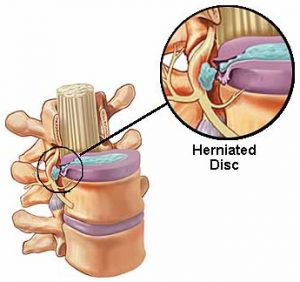Herniated disc is usually a condition that occurs when the outer fibres or annulus as they are medically known gets damaged or injured which in turn results in the disc rupturing out of its usual space. The thoracic herniated disc is a condition that is medically termed as very serious.As it can cause paralysis below the waist. The reason behind this is the extreme pressure on the spinal cord when the herniated disc is in the mid back. However, these thoracic herniated disc cases are not common and usually herniated disc occur in the lumbar spine.
Herniated Disc Symptoms
The first and foremost symptom of a herniated disc is pain. Patient can suffer from neck pain,  back or cervical pain as well as pain directly in the region of the sore disc. However, if a patient is suffering from thoracic type of herniated disc he can also suffer from pain in the chest region. The patient suffering from this type of herniated disc may also suffer from pain in the abdomen, kidneys or heart.
back or cervical pain as well as pain directly in the region of the sore disc. However, if a patient is suffering from thoracic type of herniated disc he can also suffer from pain in the chest region. The patient suffering from this type of herniated disc may also suffer from pain in the abdomen, kidneys or heart.
On the other hand lumbar disc herniation symptoms include back pain and leg pain. The pain is usually caused by compression on the nerve. Other symptoms of herniated disc can also include sensory, motor as well as reflex loss.
Weakening of muscles, abnormal bladder and bowel movements, numbness and tingling in legs, arms and shoulders are other symptoms of herniated disc.
Herniated Disc Diagnosis
Herniated disc diagnosis is usually done with the help of a physical examination as well various imaging tests like X-ray, CT scan and MRI scan.
Herniated Disc Treatment
Herniated disc treatment option includes non-surgical options like physical therapy, chiropractic, neck-collar traction acupuncture as well as anti inflammatory medication. Surgical options include cervical artificial disc replacement. In certain cases doctors can also advice oral or epidural steroids.



